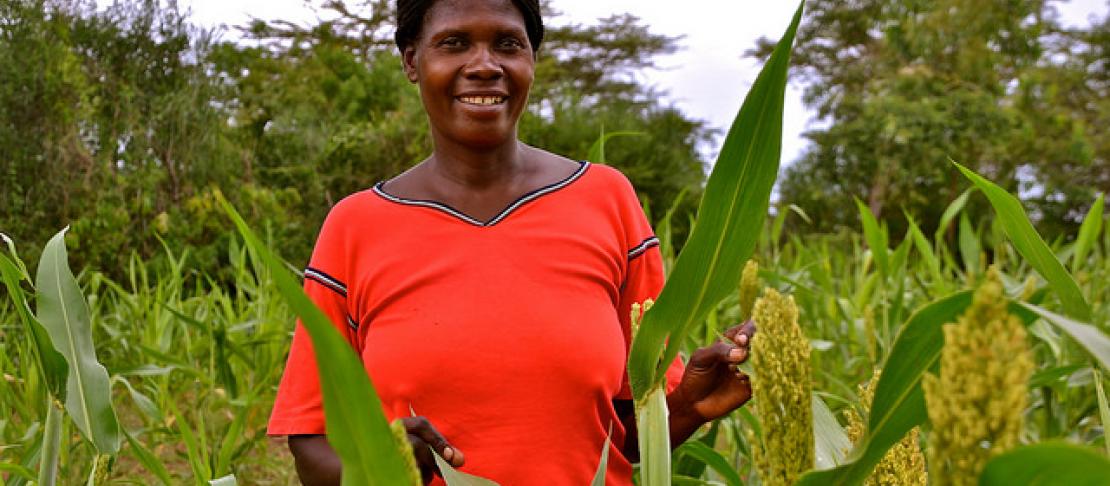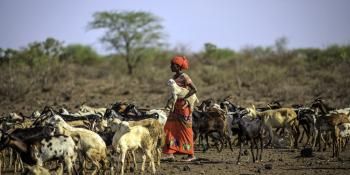Policy gaps between creation & implementation: Putting climate change policy into action

Policies should not only support an enabling environment for climate change adaptation, but also help implementers create and foster enforcement structures.
Despite policies and governance systems designed to support climate change adaptation, African smallholder farmers continue to struggle with the effects of changing weather patterns. Together, researchers from the International Institute of Tropical Agriculture (IITA), International Center for Tropical Agriculture (CIAT) and the World Agroforestry Centre (ICRAF) wanted to know why, in spite of the progress made towards supportive governance systems, climate change policy implementation remains limited.
The researchers focused on the Rakai district of Uganda. Due to a number of factors, including climate change, yields in the district have stagnated. Individual adaptation strategies include crop diversification, the adoption of improved crop varieties, and moving away from dependence on large herd animals to small stock animals.
While some farmers have successfully utilized these tactics, overall adoption rates remain low. As smallholder farmers are uniquely vulnerable to climate change, the limited use of coping strategies is troubling. Furthermore, the potential for future, weather-related stressors will, in all likelihood, increase. Given this background, effective policy is especially important.
This study, which included a review of policy documents, interviews with policy experts, and focus group discussions with smallholder farmers, found a number of challenges to successful climate change policy implementation.
Institutional challenges to climate change adaptation: A case study on policy action gaps in Uganda
An analysis of policy documents indicated a disconnect between centralized government agencies, local governments, and local communities. These findings were reiterated by local and NGO-affiliated representatives, who claimed they are not sufficiently included in the policy process. According to interviewees, local groups are often not consulted or, if they are, are given an unrealistic timeframe to prepare for policy discussions.
Coordination between national and local actors and across departments is also deficient. Committees or roles that are assumed at the national level are often nonexistent or poorly functioning at the district or local level. A lack of ownership of donor assisted project interventions also contribute to disjointed implementation efforts. Often, when funding runs out, processes fall apart.
Additionally, the shortage of local actors with technical skills reduces their ability to strategically plan and make full use of available resources. These factors, along with insufficient funding and staff numbers, serve as barriers to policy implementation. Interference by politicians can also undermine policy. For instance, political leaders may not enforce unpopular rules or they may support projects which undercut environmental goals.
Focus group discussions also revealed a number of key insights. One of these findings was that men and women have differing perceptions of environmental changes. While men tended to note a decline in soil fertility, women were more likely to notice droughts and vegetation loss. The researchers attribute these differences to gendered agriculture activities. Socioeconomic changes related to climate change, including unemployment, hunger, and domestic conflict, were also discussed. Again, the types of changes were noticed differently between men and women. Altogether, focus group discussions further supported the need for gender responsive approaches to climate change adaptation strategies.
So, how can policy makers continue to create good policy and support its implementation? The researchers have several recommendations.
Beginning with inclusivity, all stakeholders should be given the chance to provide input into policy development through a participatory, “bottom up” process. Policy should also be informed by research. The authors of this study advocate for further studies and the inclusion of policy makers throughout the research process. This not only allows for greater buy-in on the part of policy makers, but could lead to the integration of research findings throughout policy discussions.
Constraints to effective policy implementation and adaptation appear across scales (e.g. household, farm, community, markets and policy levels). Addressing the continuum of constraints includes a good analysis of constraints and opportunities across these levels.
Communication improvements can also bolster effective policy implementation. Consistent messaging and stronger communication links between national and local stakeholders can inform policy and bolster its support across governance levels. Finally, shifting power away from the central government to local authorities supports local policy implementation.
The challenges associated with climate change will continue to impact smallholder farmers, threatening food security and livelihoods. Effective and properly implemented policy can help vulnerable populations manage these changes and remain resilient.
Download the article: Ampaire, Edidah L.; Jassogne, Laurence; Providence, Happy; Acosta, Mariola; Twyman, Jennifer; Winowiecki, Leigh; Van Asten, Piet. 2017. Institutional challenges to climate change adaptation: A case study on policy action gaps in Uganda. Environmental Science and Policy 75: 81-90.
Kathlee Freeman is a communications consultant with the CGIAR Research Program on Climate Change, Agriculture and Food Security (CCAFS).




